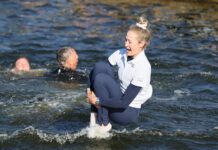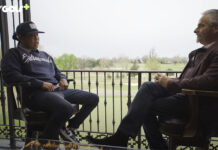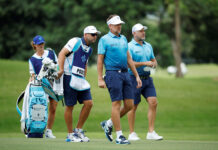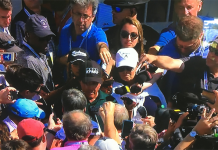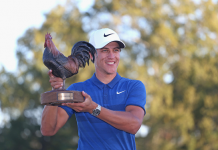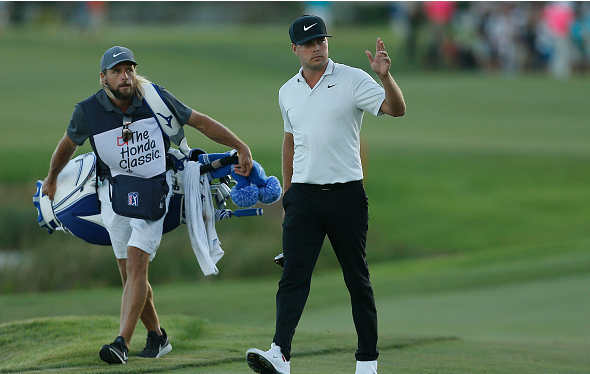
With a final-round 67, Keith Mitchell claimed a one-shot victory over Rickie Fowler and Brooks Koepka at The Honda Classic.
Mitchell finished his four rounds at PGA National’s Champions Course on 9-under par to secure his maiden PGA Tour title. The victory earned the 27-year old Tennessee native $1,224,000 and 500 FedExCup points to move to No. 17 on both the money list and points standings.
Afterwards, Mitchell met with the media at PGA National Resort and Spa. Here are a few of the best questions and answers from the press conference.
ROUGH START
After you bogeyed the first two holes today, what were your thoughts, and what did you change and so on?
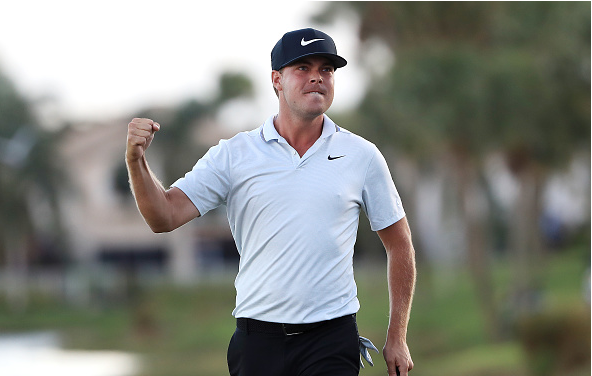
KEITH MITCHELL: I wouldn’t say the first two bogeys were nerves. I would say they were bad execution. I was so mad. I was a little frustrated on the first hole. I was just — I was anxious is the best way to say it.
I’ve been working really hard with my caddie to try to not let my emotions take over, and what I do is I block him out and I get mad and I don’t talk, and I walk fast and put my head down, and I was telling myself, I was like, I know that’s my problem. I know that’s my mistake, but it’s so hard to overcome that and talk about something — about what you’re doing for dinner or anything, anything to get my mind off what was actually happening.
I really focused on that walking up No. 3 because I knew I could have a chance to birdie that hole, and normally I would go for that green in two from the yardage I was at, and I didn’t because I was focused on getting some momentum back, and I didn’t want to try to pull off a stupid shot and my day be over on the third hole.
So I actually laid up on purpose, which is rare, but I laid up exactly where I wanted to and hit my chip shot exactly where I wanted to and I made birdie, and I used that as momentum going forward.
REDEMPTION
Just wondering if it felt like karma or maybe redemption, I guess, you had a 15-footer a couple years ago at Pumpkin Ridge and missed that. Just wondering — to get your card, and just wondering if that feels like a long time ago or does it feel like you paid one back today?
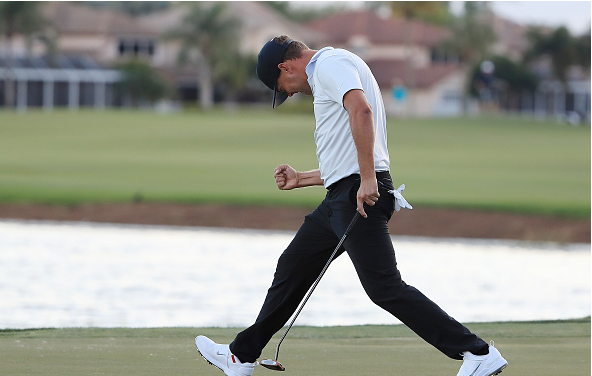
KEITH MITCHELL: I actually thought about it this morning on the car ride over here because the feeling of missing out on an opportunity or the feeling of – I don’t want to say losing, but the feeling of putting yourself in the position to win or to succeed and then not coming through or not taking the moment as yours is something I’d struggled with in the past because you want it so bad. If you think that way, it’s never going to be a good outcome.
So this morning, I tried to remind myself of a few times that I actually missed out and those feelings, and knowing that I didn’t want to have those feelings today, that I wanted to be – I wanted to overcome those, and I wanted to see what it was like on the other side.
I had that chance on 18, and it was tough. It was tough to sit there and focus just on your putt and just on the break and just on the read because you know what’s on the line but I was able to do it, and I hit a great putt.
GEORGIA ROOTS
I was just wondering if you can talk about your days at UGA in Athens, how much you learned from the upperclassmen when you got there, and the second question would be just looking at your numbers, you struggled a little bit after the freshman year. What was the turning point for you in your career college?
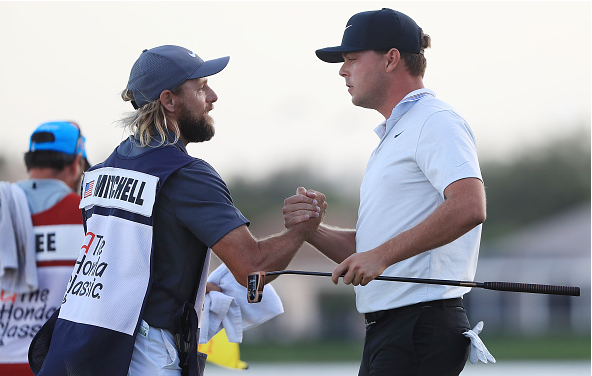
KEITH MITCHELL: My freshman year at Georgia, I was a true freshman. I enjoyed college. I didn’t know what was going on, didn’t have responsibilities, practices, getting in routines. I didn’t have any of that.
But thankfully I had Harris English, Russell Henry and Hudson Swafford who were older than me, and thankfully they were really good at the time because I wasn’t very good and they kind of carried the team. And then when they left, I kind of realized that I had to grow up a little bit, because with those three guys on the team, it didn’t matter what the fourth and fifth guy were shooting or the guys below that because they were so good, and then you realize if you’re going to be the guy that the team is going to lean on, you have to grow up, and I had to grow up fast.
I did here and there. There was definitely times that I wish I could go back in college and be a little bit more dedicated. But once I turned pro and you’re out here playing for yourself and nobody else and you’ve got to pay off your credit card bills and it costs a lot of money to do it, it makes you realize, you really got to want to do this, you really got to want to play.
Luckily at Georgia that was kind of our mentality that we had qualify every week, and it just made you a better player. That’s why there’s so many guys out here that went to Georgia because nobody ever held our hand, nobody ever made us practice, nobody ever gave us lessons on the range.
I mean, you were out there and you had to prove yourself from day one and the only way you could prove yourself was scores on the golf course. They never picked a team, none of that.
So I’m thankful for Georgia in that way, because it really made me grow up fast, and it really — it taught me a lot when I turned pro.
Credit: PGA Tour Media, Getty Images, ASAP Sports







